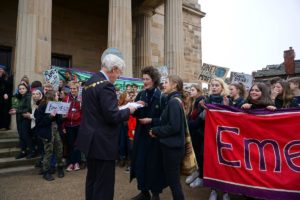
The book I wrote over the last couple of years was called ‘System Change Now!’ and I’m currently running a monthly discussion group with the title ‘Exploring System Change’. What exactly do I, and the millions of others seeking system change, mean?
As is all too apparent the climate is changing and extreme weather events are becoming ever more extreme, and ever more common. Countless species of plants and animals are becoming extinct or are in worrying decline. Many aspects of human health and wellbeing are deteriorating due to increasing pollution, poverty and stress. None of it has to be this way. Everything could be turned around, but that implies a scale of change inconceivable under present political and economic systems. So, those political and economic systems can and must be changed.
Changing global political and economic systems will not happen through a single manifesto or violent revolution, but it is already happening in myriad ways that interconnect into a complex ecosystem of change making.
For decades big oil has known about the likely climate impacts of burning oil, and has systematically lied to us all about it. Their objective was to keep profits rolling in, whatever the terrible consequences might be. They funded, and continue to fund, think tanks that have dominated our media and our politics, and therefore our investments and our infrastructure. They have deliberately attacked climate scientists and delayed action to reduce emissions and have prevented any meaningful debate about leaving the remaining fossil fuels in the ground. At long last this is being challenged as Californian governor Gavin Newsom has filed a lawsuit against Exxon Mobil, Shell, Chevron, ConocoPhillips and BP. Much more climate litigation will follow.
Simultaneously the whole cleantech and renewable energy sector is making massive strides forwards. Now quitting all fossil fuels and moving the entire global economy over to 100% renewables for everything, (electricity, heating, cooling, transport and industry) looks both economically and ecologically the most sensible thing to do, and do as fast as humanly possible.
In last week’s discussion group Nick Sherwood cited the old adage ‘Think Global: Act Local’. I find it endlessly fascinating to read and to think about these changing global possibilities, but our ability to act is severely limited on this global stage. Haydn, connecting into the group via livestreamed social media, wanted to know about the very local issue of why Hereford is so car-centric, and provision of walking and cycling infrastructure, and of public transport, is so poor. Of course decades of politicians and planners influenced by the lobbying power of big oil has not helped. But this can be turned around. We have countless examples of cities around the world that have massively reduced car use and promoted active travel, better public transport and localized services. Dutch and Danish cities have long since led on this, but Paris is now rapidly moving in this direction. Hand in hand with this often goes to desire to improve air quality and clean-up rivers and waterways, all resulting in major gains in terms of human health and wellbeing.
The interconnection between the local and the global is well demonstrated by this example. To help improve life in Hereford we need to learn from the cities that have made this transition away from cars and pollution and toward more human-friendly urban spaces. We need to debate the possibilities, and Professor John Whitelegg with be leading such a discussion, focused on the adoption of a 20mph speed limit, at De Koffie Pot, Left Bank, Hereford, 7.00pm tomorrow evening (Weds 20th Sept). We also need better politicians, and helping Ellie Chowns of the Green Party beat the Tory Bill Wiggin at the upcoming General Election would greatly help matters, as would Diana Toynbee unseating Jesse Norman. These are all small steps in a vast and global movement seeking to change our systems; our systems of transport planning, of politics, and of pretty much everything else.


